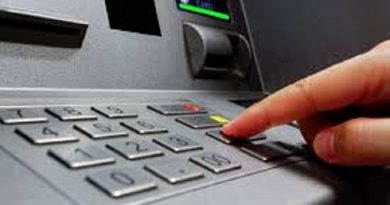Despite Govt Clampdown, Businesses Continue In Unlicensed Digital Banks
Despite Govt Clampdown, Businesses Continue In Unlicensed Digital Banks
Unlicensed Moneylenders in Nigeria has continued to disregard the orders of the regulatory body, the Federal Competition and Consumer Protection Commission (FCCPC).
Despite the recent clampdown on some unlicensed digital money lenders in the country some of them are still conducting their businesses, as usual.
LEADERSHIP Sunday learnt at the weekend.
While the clampdown arose from several complaints from consumers about exorbitant interests on loans and harassment of debtors which the FCCPC requested should be stopped, the online money lenders were not remorseful, hence, continue to compound huge interest rates on old and fresh loans while still bullying and threatening debtors, acts the consumer’s protection agency orders them to stop.
They are granting fresh loans at the old terms and conditions and still threatening debtors on repayments.
Earlier, the FCCPC had in a joint operation, raided at least seven such firms operating in Ikeja, Lagos. They include; GoCash, Okash, EasyCredit, Kashkash, Speedy Choice, Easy Moni, Soko Loans, among others.
The vice-chairman/chief executive officer of FCCPC, Babatunde Irukera, had warned the affected companies that violators of the order would be subjected to the full extent of the law including prosecution (without the option of administrative regulatory resolution).
Although he stated that the order does not include existing borrowers repaying legitimate loans under fair and acceptable terms and conditions or any modifications to previous terms and conditions that are considered onerous, inconsistent with prevailing law or general principles of transparency and fairness, he added; “In the interim, the commission admonishes all the businesses that were subject of regulatory intervention on Friday, March 11, 2022, to cease and desist the interest compounding and loan repayment/collection practices that are the objects of this investigation.
‘’In the event that any of these businesses continue in any of this conduct, or the commission receives credible evidence of such, violators will be subjected to the full extent of the law including prosecution (without option of administrative regulatory resolution). The obligation to comply with the above extends to all operatives, employees or agents of the affected businesses.’
Despite this warning, it was gathered at the weekend that most of the affected online money lenders had continued their bullying and compounding interest rates as high as 40 per cent which must be repaid in seven days.
A Twitter user, Angel Essell said, one of the listed defaulting firms, LCredit, was still on it and was sending defamatory messages to contacts boasting that government cannot stop them
Despite Govt Clampdown, Businesses Continue In Unlicensed Digital Banks
Similarly, another person who wants to be anonymous said: “LCredit and 9ja Cash are currently sending defamatory messages to contacts claiming that they were trying to run away with their money.”
While it is still unclear whether the government agency will carry out its threat as earlier stipulated, the Central Bank of Nigeria (CBN), has once again warned the public to desist from dealing with such firms.
Speaking in an exclusive interview with LEADERSHIP Sunday yesterday, the director, Corporate Communications of the CBN, Osita Nwanisobi, said the list of licensed digital banks could be found on the website of the apex bank while urging customers to ensure that they do not fall prey of illegal banks.
He urged Nigerians who have genuine complaints against registered Fintech banks to approach the regulatory body.
“Of course, CBN regulates the Fintech banks, but the question is; are they registered with the CBN? For the registered ones, CBN will intervene. If they (fintech banks) are registered, those who received such threat messages can make complaints to the apex bank and if it’s a genuine case, we will pursue the case,” he said.
On people who were never party to the loans receiving threat messages from some of the firms, he said: “If you are not a party to the agreement, you are not bound by such agreement and so, you cannot be prosecuted or punished for anything you know nothing about.”
He urged Nigerians to investigate whichever of the Fintech banks they want to subscribe to, stating that the regulatory body would only be responsible for the complaints of licensed firms.
Despite Govt Clampdown, Businesses Continue In Unlicensed Digital Banks
Meanwhile, following the clampdown, Nigerians who were lamenting the unprofessional conducts of the online money lenders have applauded government for the step it took, hoping that FCCPC would pursue the case to a logical conclusion.
Akintomide Peter said; “Imagine someone taking a loan of N15,000 and N9,000 is disbursed into his/her account to pay almost N6,000 interest within seven days. It’s that bad. If consumers will get that money within seven days, they would not have come to borrow in the first place. Some interests and service charges are hidden in some loan apps, you would get the money before you know what you are paying.”
Another person, Aleshinloye, said he supports the total shutdown of the digital banks as some Nigerians had died from the bullying and their unprofessional tactics of pursuing debtors.
“These people have killed many Nigerians by making their debtors’ pictures viral through all their contacts and also threatening them if they fail to repay the loans. It has happened to a close friend in which led to his death,” Aleshinloye said.
While some believe that government should mandate borrowers to pay back the exact loans borrowed without interest and shut them down, others blamed Nigerians patronising them despite their attitude.
Juliet Amakoromo said; “I really appreciate the effort of the commission for this, because these loan apps are something else. If not for the economy of the country, what would make someone want to be embarrassed this way? They should be shutdown forever.”
LEADERSHIP had earlier exclusively reported that no fewer than 50 Fintech banks had flooded the financial service space offering uncollateralised microloans to Nigerians at exorbitant interest rates.
Findings, however, showed that only a few of them were actually registered with the CBN.
A Fintech bank operates through an app, whereby subscribers or loan seekers are asked to download before they can access micro loans and other financial services.
Some of the current digital lending banks are; Sokoloan, OKash, GetCash, Carbon, Branch, GoCash, QuickCheck, PalmCredit, Get Loans, 9jaCash, Fairmoney, among others, while new ones continue to join this list on a regular basis.
For most of them, the requirements of an interested loan seeker are; Bank Verification Number(BVN), number, regulated identity card, information on the ATM card, place of work, likely monthly income, date of birth, among others, a development that equally raises questions about the security of that information in a digital world where hacking is becoming a regular occurrence.
All the information are to be submitted virtually or digitally as there is no human interface in this process, even as most of these firms have no physical presence in the country.
While the maturity period of such loans range between seven days and one month, the interest rate goes as higher as 20 to 30 per cent on a loan facility, even as the micro loans that can sourced from these banks range from N1,000 to N1 million and above, depending on how and the frequency of honouring your lending obligations. This is however crucial for you to grow from a small amount to a bigger loan facility.
Although, there were pockets of these banks pre Covid-19, majority of them, investigation shows , surfaced during the pandemic, offering soft loans to people who were facing hard time meeting their daily financial obligations, as some people lost their sources of livelihood.
Findings also revealed that most of these firms have devised dirty means of recouping their loans from defaulters by sending a stinking message about his loan obligations to all his phone contacts, wife, father or close relative, hence, causing psychological damage to their debtors, who must still pay back despite this trauma.
They believe that putting the defaulters to shame would make them recoup their loans.
While unconfirmed reports said these digital lending banks granted several millions of naira on a daily basis, despite the challenges of high-interest rates, poor services, among others, the rate of default has been on the increase, partly due to high interest rates that debtors struggle to cope with at the point of settling their debt.
In the end, they borrow from friends and relatives to settle this debt and request for other loans, thereby making them, forever servants to these digital banks. To these end, most loanees now have multiple loan apps, by settling one debt with another, just like recycling loans.
Earlier, while speaking with LEADERSHIP, a renowned Economist, Mr. Tayo Bello, said the digital banks are cashing on the challenges in the economy and the desperation of Nigerians to just get credit at all costs without minding the interest rate.
He said the 30 per cent interest of these digital loans is alarming, and makes repayment difficult in some instances, adding that under no circumstance is it profitable to be living on such loans.
He believes some of them would be having huge unpaid loans as it stands as smart Nigerians might circumvent their system and escape with the loans.
On security of information that customers are divulging on these loans app, he urged customers to be extra careful in a world where hacking is becoming more pronounced, stating that vital information such as your BVN, ATM card details, date of birth, place of work and so on, should be private and should not be a public document.
He warned the patrons to be extra careful not to have their fingers burnt in the process, adding that the digital banks are just using the uncollateralised loans as the bait to gain customers.
“In a country ravaged by poverty, unemployment and non or low disposable income, people can go to any length to get money. It’s surprising how people can survive on such lending with outrageous interest rates which is to be paid under one month,” he said.




